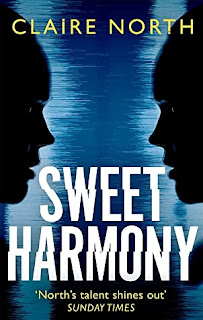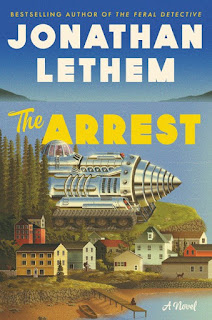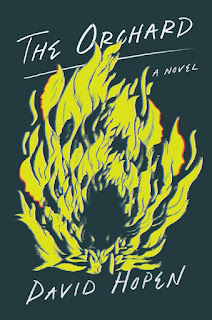Stacked-Up Book Thoughts; Or What I Read in November
 Can it be? This year is almost over, and most of us can't wait to say good-bye to 2020 and hello to new possibilities and a happier new year. November turned out to be a kind of bust of a reading month. The first week was taken up with election news and the last week with Thanksgiving. In between I read and listened to small batch of meh books. Well, some months are like that, I guess.
Can it be? This year is almost over, and most of us can't wait to say good-bye to 2020 and hello to new possibilities and a happier new year. November turned out to be a kind of bust of a reading month. The first week was taken up with election news and the last week with Thanksgiving. In between I read and listened to small batch of meh books. Well, some months are like that, I guess.
I'm still in the middle of three books: one is a book of essays, one is nonficiton, and the other is a thriller. I'll write about those at the end of December. In the meantime, here are my thoughts on November in books.
Note that I've also posted these thoughts in GoodReads. Thanks to the publishers for the review copies -- whether audio, digital, or print. If you see "AFM" at the end, visit AudioFile Magazine to see my review of the audiobook production.
First I want to mention a book I didn't finish. Early in November I started Tower of Fools by Andrzej Sapkowski (trans. David A. French, Orbit, Oct. 27). This book has all kinds of elements I usually really love: history, religious politics, Renaissance, and fantasy. It's also a book in translation, which is normally a draw for me. Unfortunately, it just didn't click, maybe owing to my pre-election mood. I might try this again.
It's clear Cooper dug deep into this case, conducted as many interviews as possible, and honored the life and work of the victim, Jane Britton. I know published reviews praised this book to the ends of the earth, and I can see why because of the quality of Cooper's investigation and because the book reveals many less-pleasant aspects of academia and graduate departments: gender inequality, socioeconomic privilege, department politics, and Harvard culture. On the other hand, Cooper's account could have used a tighter edit to eliminate filler, tangents, some of the dead-end paths, and some rambling. Still, if you like true crime, you'll like We Keep the Dead Close.
I listened to the unabridged audiobook, which was read by the author. Cooper did only an okay job as a narrator. She's clearly not a professional or a dynamic voice actor, and a few mispronunciations were annoying. My advice is to listen to a sample before trying the audiobook. Sweet Harmony by Claire North (Orbit, Sept. 22). Set in the future, this short book explores addiction, relationships, FOMO, self-image, and an acquisitive society. In Harmony's world, people can buy biological upgrades through a phone app: no more broken-out skin and no more weight gain; it's possible to have perfect teeth, perfect hair, level moods, perfect health, and so on. The problem is, each upgrade comes with a monthly fee, quickly plunging Harmony into insurmountable debt. When she can't pay, her enhancements stop working, one by one, which not only affects her self-image but also leads to the destruction of her relationships and her being downsized at work.
Sweet Harmony by Claire North (Orbit, Sept. 22). Set in the future, this short book explores addiction, relationships, FOMO, self-image, and an acquisitive society. In Harmony's world, people can buy biological upgrades through a phone app: no more broken-out skin and no more weight gain; it's possible to have perfect teeth, perfect hair, level moods, perfect health, and so on. The problem is, each upgrade comes with a monthly fee, quickly plunging Harmony into insurmountable debt. When she can't pay, her enhancements stop working, one by one, which not only affects her self-image but also leads to the destruction of her relationships and her being downsized at work.
North offers an interesting perspective on many contemporary issues, which might make this a good book club pick. I, however, simply just didn't like Harmony and couldn't get behind her choices. If the book had been any longer, I'm sure I would have DNF'd it. For my thoughts on the audiobook, see AFM. The Constant Rabbit by Jasper Fforde (Viking; Spet. 29). I love Fforde and went into this book with high hopes. Warning: It took me a while to warm up to the story, and it is certainly not my favorite of his books. What I did like was the satire on all things sociopolitical in contemporary America and the UK.
The Constant Rabbit by Jasper Fforde (Viking; Spet. 29). I love Fforde and went into this book with high hopes. Warning: It took me a while to warm up to the story, and it is certainly not my favorite of his books. What I did like was the satire on all things sociopolitical in contemporary America and the UK.
The book opens about 50 years after there was a cosmic event in which several species of mammals (including rabbits, weasels, and foxes) and a few insects became anthropomorphized. While these creatures retained much of their animal characteristics, they also became kind of human: they were able to speak and read and drive cars and own homes and have jobs right along side humans. Fforde uses the interactions between people and the human-like animals to explore prejudice, integrated neighborhoods, power, equal rights, citizenship, and so on.
There were some laugh-out-loud moments and lots to think about. On the other hand, the whole thing became a bit wearying once the general gist and message were clear. My very positive review of the audiobook can be found at AFM. The Arrest by Jonathan Lethem (Ecco; Nov. 10). Set in the future, this book explores what happens to society and the world when we suddenly lose the power to run our TVs, computers, phones, and cars. Different groups of people react differently to the new normal, some making political power grabs and others trying communal living, hiding in isolated paranoia, forming bands of militia, and so on. Without mass communication, no one knows what's happening in the world outside their own small community.
The Arrest by Jonathan Lethem (Ecco; Nov. 10). Set in the future, this book explores what happens to society and the world when we suddenly lose the power to run our TVs, computers, phones, and cars. Different groups of people react differently to the new normal, some making political power grabs and others trying communal living, hiding in isolated paranoia, forming bands of militia, and so on. Without mass communication, no one knows what's happening in the world outside their own small community.
When the Arrest happened, Hollywood script doctor Sandy was visiting his sister, who runs an organic farm in Maine. When transportation and communication go down, Maine is where he had to remain, and he now does odd jobs for the town's butcher and for the farm. Where Sandy lives, all is peaceful. The residents have almost no contact with outsiders until a mega movie producer friend from Sandy's past shows up in a mysteriously powered vehicle and begins to woo the town and disrupt the delicate balance of peace.
The book was only okay for me. The drama and tension among Sandy, his sister, and his friend didn't fully resonate, and I found much of the story just kind of weird. I liked the dynamics of the town and its relationship to the more militant group that lived nearby, but I was less intrigued when the plot spun into a different orbit. On the other hand, Robert Fass did a super-duper job with the narration of the audiobook, especially in the way he created a mood and connected us to the characters' mental state. The Orchard by David Hopen (Ecco; Nov. 17). I really wanted to love this book because I was taken by the premise: An ultra-Orthodox Jewish family from Brooklyn moves to south Florida to another Orthodox Jewish community, but one that is more connected to contemporary America.
The Orchard by David Hopen (Ecco; Nov. 17). I really wanted to love this book because I was taken by the premise: An ultra-Orthodox Jewish family from Brooklyn moves to south Florida to another Orthodox Jewish community, but one that is more connected to contemporary America.
Ari Eden is just about to start his senior year of high school. In Brooklyn, his yeshiva concentrated mostly on Jewish studies, preparing young men to be good members of their closed, religious community. The Florida yeshiva, however, covers all subjects and while religious, also prepares its students (male and female) for college and life in the world at large.
The story promises to show how Ari adjusts to his new life, mingling with Orthodox Jews who bend the law--for example, not always wearing a yarmulke and allowing casual touching between unrelated men and women. While the book is a lot about that, the events and relationships don't seem at all realistic. Ari quickly falls in with the cool kids; has a girlfriend; and discovers smoking, drinking, and drugs. Despite being well behind in some academic subjects, he seems, with minimal tutoring, to keep up with the rest of his class and is on a path to graduation and possibly college. His friends are privileged and wild, suffering few consequences for their actions. At the same time, they come off as religious and philosophical scholars.
The boys' explorations into the mysteries of God and the spiritual world don't ring true. It's hard to imagine seniors in high school behaving and thinking the way they did. The cast includes at least three high school girls and a couple of adult women, all of whom are uni-dimensional and seem to appear only for a love interest or for motherly concern. It's a shame, because the the setup offered much to be explored about the interface between strict religious traditions and contemporary society. The Survivors by Jane Harper (Flatiron, Feb. 2). I'm a big fan of Jane Harper, and her newest didn't disappoint. When Kieran returns to small coastal town in Tasmania to help his mother settle his father in a nursing home and close up his childhood home, he knew things would be uncomfortable. After all, a dozen years ago during a tremendous storm, he got trapped on a rocky beach; when his brother and a friend tried to rescue him, their boat capsized and the pair drowned. Most people in the small town (and maybe even Kieran's parents) blame Kieran for those deaths, though the storm also took others, including a teenage girl whose body was never found.
The Survivors by Jane Harper (Flatiron, Feb. 2). I'm a big fan of Jane Harper, and her newest didn't disappoint. When Kieran returns to small coastal town in Tasmania to help his mother settle his father in a nursing home and close up his childhood home, he knew things would be uncomfortable. After all, a dozen years ago during a tremendous storm, he got trapped on a rocky beach; when his brother and a friend tried to rescue him, their boat capsized and the pair drowned. Most people in the small town (and maybe even Kieran's parents) blame Kieran for those deaths, though the storm also took others, including a teenage girl whose body was never found.
On Kieran's first night home, a young woman is murdered on the beach. The investigation opens up old wounds and hurts within the community, affecting Kieran's relationship with his parents, his friends, and even his girlfriend and their infant daughter.
This is a multilayered, atmospheric mystery that masterfully interlaces the past with the present. Harper has a way of making the landscape come alive, acting almost as another character. The story is character driven, and Kieran's personal journey is as important as solving the murder. This is a don't-miss read.
Narrator Stephen Shanahan is a perfect match to Harper's prose, and he once again captures the heart the soul of her work. Recommended in either print or audio.












10 comments:
I think November was a tough month for many. I too enjoy Jane Harper though I didn’t think The Survivors was her best. I’m really looking forward to the movie of The Dry though, the trailer is promising
Wishing you a great reading week
This whole year has been difficult as far as my reading goes. Between the pandemic and the election, I've been more glued to the news this year than ever before. I'm hoping that will change in 2021.
I don't think I've read anything by Jane Harper, but this sounds like a really good book.
Hope you have a great week!
I have my eye on We Keep the Dead Close. Enjoy your week, and thanks for visiting my blog.
I have a copy of We Keep the Dead Close, but I'm not really a fan of true crime. Both The Arrest and The Orchard sounded promising to me, so I thank you for your thoughts about both of these.
Interesting variety of books. The Survivors catches my eye. Come see my week here. Happy reading!
November was pretty much a bust for me, too. We Keep the Dead Close is on my wish list... thanks for the heads up on the audio. Will be sure to sample first.
Sorry you just had a meh reading month - I agree, it happens sometimes!
Wow, I didn't know you were an anthropologist! That must be weird to read a true crime book about a case and people you are familiar with.
We are new to Jane Harper - my husband and I both read her first book this year, and I just gave my husband her 2nd one. This new one sounds like it has some similarities with The Dry - a man going back to his hometown, where people think he's responsible for an old death(s). Good to know the quality of her books continues - we have some catching up to do!
Hope you enjoy your books this week -
Sue
Book By Book
I'm really curious about the Harper book.
I have the print edition of We Keep the Dead Close - looking forward to trying it. I agree at least the first week of Nov was a bust and although I did okay, my reading stats overall are down a bit this year. Hope the rest of the year is good for you.
I'm looking forward to Jane Harper's latest and have it on audio, but I still need to read her previous book. Somehow, I never got around to it.
I'm about halfway through The Fireman (Joe Hill) and had to set it aside for a book club read (American Dirt). Hill's book is SOOO long and I'm not excited about going back to it, but I've invested so much listening time that I hate to call it quits. But do I want to waste more time, if it's not wowing me? Such a dilemma, right?
Hope all is well. We'll get through this year, one way or another, right?
Post a Comment